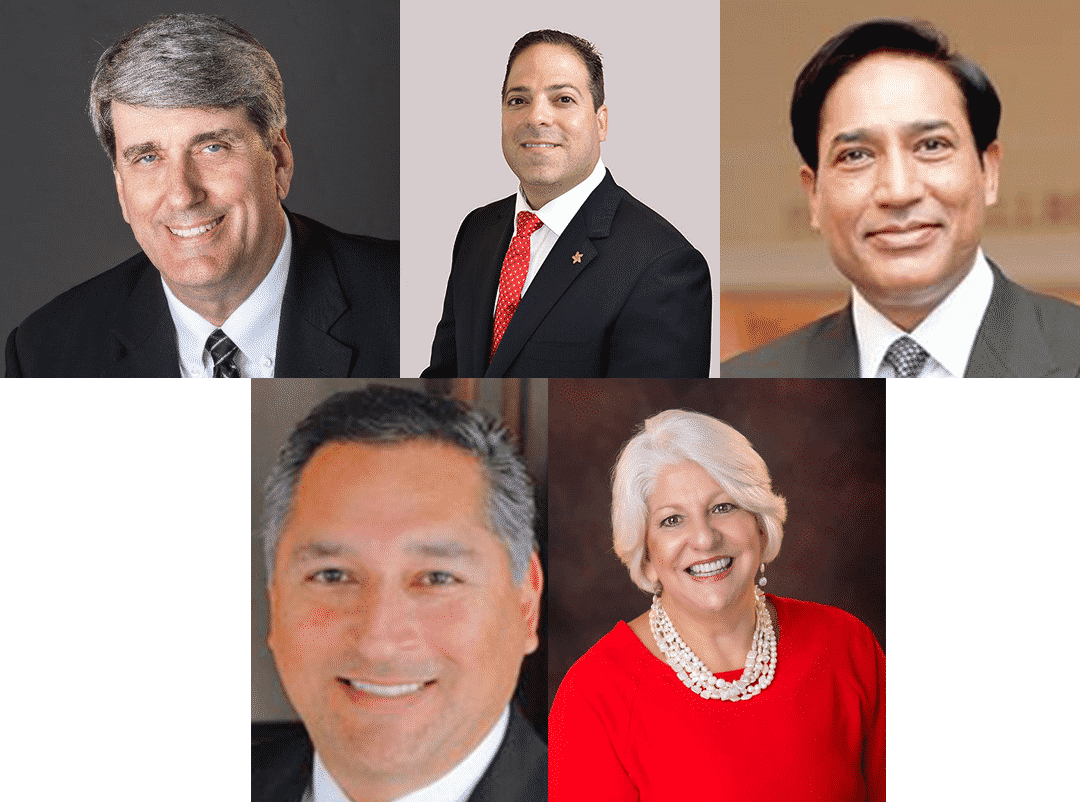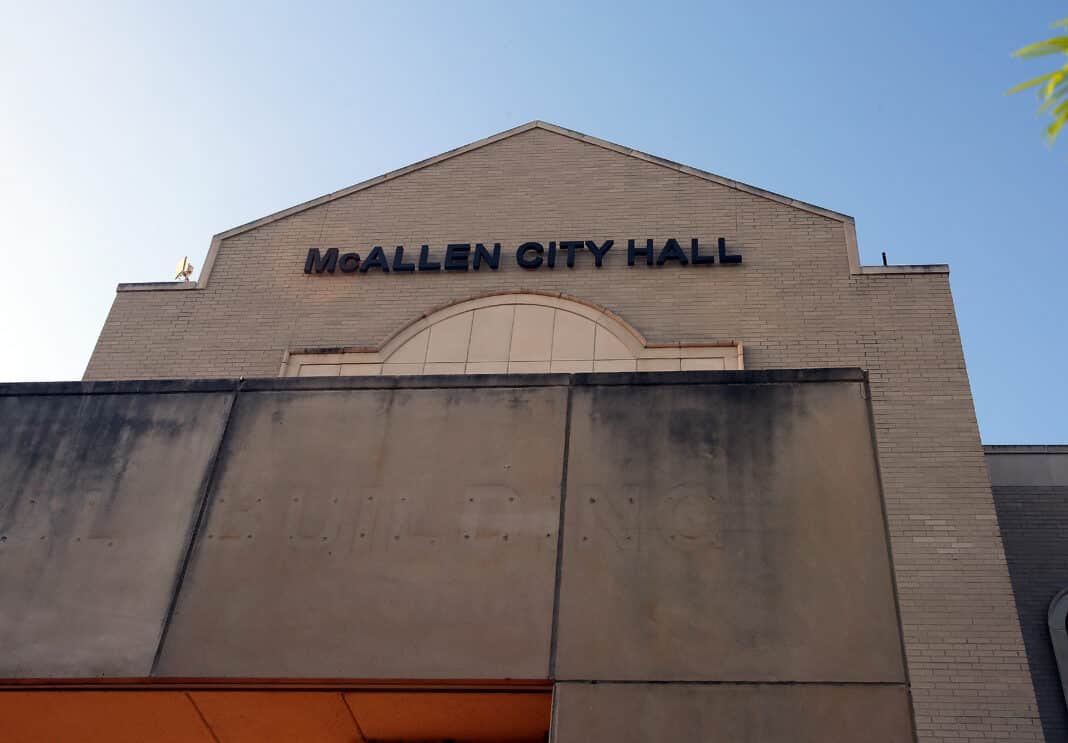The five candidates running to be the next mayor of McAllen took the virtual stage Wednesday for the first debate in the lead up to the city’s May elections.
Hosted by the McAllen Rotary Clubs, the debate had each candidate take turns answering a set of questions ranging from why McAllen citizens should care about who is the next mayor to what each candidate is prioritizing when it comes to infrastructure.
But also posed to them was what they perceived to be the city’s weaknesses and how they would address them.
Businessman Michael A. Fallek said the city needed to bring more businesses.
“The challenge in the city of McAllen is to lure new business to town,” Fallek said. “We have so much to offer here in McAllen, but we constantly have a challenge in order to pay for those items. I believe that we need to build coalitions, we need to build consensus, we need to figure out how to properly partner with the various constituencies in McAllen — the school districts, the county and state and federal government.”
Fallek also pushed for the need to advance the education prospects for the younger generation.
“We won’t advance the interests of the city until we increase the educational profile,” he said. “We have so much that we can partner with and by increasing those prospects, not just with our school district — with IDEA, with STC, with UTRGV, with the new Texas A&M campus here — we can expand the opportunities for those here in the city.”
He argued that by increasing education, there would be more opportunities in business. They would be able to lure more businesses here if the city had a workforce educated and capable of handling those new jobs.

Attorney and current District 1 Commissioner Javier Villalobos said the city wasn’t in a bad position but agreed they could do better, especially when it came to small businesses.
“One of the weaknesses we have is that we have neglected our small businesses,” Villalobos said. “There’s a lot of things we can do to help out even through start up and we don’t.”
“You go through Nolana, Trenton, 10th, 23rd Street, that is the backbone of McAllen,” Villalobos added. “Those are the businesses that put their capital at risk a lot of the times. When there’s a possibility of somebody going under, we are never there to help and I think we should.”
For Othal Brand Jr., president of Hidalgo County Water Improvement District 3, the challenges were in drainage.
“It doesn’t make any difference how good your structure is, your streets, your schools, your businesses, it doesn’t make any difference,” Brand said. “If you don’t have proper drainage, you’ve got a problem for the entire community and the functionality of the community.”
Brand, who ran for mayor in 2017 and whose father served as mayor from 1977 to 1997, said the money the city has invested in drainage was a “great start” but said there needed to be more.
“There is a fix and that’s fixing the outlets, not internal plumbing, which is what we’ve been focused on,” Brand said, “which is great, but (we need) to continue that and the outlets that drain the city.”
Dr. Shahid Rashid, a physician specializing in pain management, said the biggest problem was the pandemic and the devastation it caused to the city.
“We have almost lost 4,000 citizens to this disease,” Rashid said about the Rio Grande Valley. “Every day, we’re having 10 to 15 that are dying. There are 120 to 130 people in the ICU, and that has never happened in our history before.”
As mayor, Rashid said he would implement a COVID-19 task force that would assist with testing, vaccine rollout, and treat patients currently hospitalized in intensive care units.
He added he would also like to have a post-pandemic plan to address patients that would continue to experience long-term effects from COVID-19.
“This is going to be the biggest, biggest challenge for our healthcare system and on top of that, we will be losing a lot of the workforce because of this disease,” Rashid said. “So I think that at this time, we need to focus on how we could be able to get out of this pandemic and how we could be able to treat our patients, and I believe that I’m the only physician and the person who has the public health training and skills to handle this grave condition.”
Current District 6 City Commissioner Veronica Whitacre listed about four issues she wanted to focus on — jobs, education, traffic and permitting regulations.
“In our force today, now that we’re going to be able to open up a little bit more, jobs are now going to be more available for all those who did lose their jobs during the pandemic,” Whitacre said. “Maybe a little bit higher paying jobs would also help our economy and help our community, so we just need to focus more on local, small businesses and help them thrive in the next coming years.”
When it comes to education, Whitacre said the city should work with the McAllen Independent School District and their loss of students to charter and other private schools.
As far as traffic, she referred to a city traffic study from which they have started to implement different ways to improve its flow.
The five candidates were also asked about immigration and how the city should deal with the issue.
“Honestly, I don’t want the immigrants coming in through McAllen whether they’re illegal or not because it causes issues and specifically more now with COVID,” Villalobos said. “But the thing is, it is not up to us, the federal government is picking them up, dropping them off at the bus station. So the question back then and the question now is what do you do?”
He said that when the city began to deal with the surge in asylum seekers, they received assistance from Catholic Charities of the Rio Grande Valley, which continues to provide asylum to migrants.
“And that was not because we’re for immigrants or against or anything,” Villalobos said. “That was because we are pro-McAllen citizens; we wanted to make sure that we kept our citizens safe.”
Brand agreed that it was a federal issue, one that the city had little control over.
“We are simply bystanders or even, in some cases, potentially collateral damage from policies that are passed out of Washington,” Brand said.
To handle the issue, Brand advocated for more public-private partnerships, like the one the city has with Catholic Charities, to establish additional assistance to help the migrants get to their final destination, which is typically elsewhere in the country.
Brand added he wanted to ensure law enforcement had the tools they needed to maintain the city’s safety regarding this issue.
But Rashid pushed back on the idea that the asylum seekers were a law enforcement issue.
“We are a nation of immigrants, and immigrants are our strengths, they are not a public safety issue,” Rashid said. “The thing is, we are a border town and it’s our responsibility. It’s going to happen, it’s been happening in the past, and it will continue happening.”
He pushed for a more proactive agenda by partnering up with the mayors of the cities throughout the region.
“We have to collectively sit down and approach our state representatives in the federal government,” Rashid said. “It’s a national policy and in order for us to fulfill that national policy, we need to ask them to help us out with the financial resources.”
Whitacre also believed the city needed to work together with nearby municipalities in addressing the issue, and with regard to possible risks they might pose to the community, she noted that asylum seekers passing through the city are tested for COVID-19.
“I know that if they were to go through the respite center or before they even get on the flights to whatever city or other state that they’re going to, they are taking the COVID test,” Whitacre said. “It’s unfortunate they’re not taking the COVID test prior to crossing, but that’s something that we have to deal with and that’s something that we have to work through, which is fine as long as we are able to have other municipalities helping us in taking care of all of those things.”
She said she favored enacting a plan for all border regions dealing with this issue, as long as the federal government assists them in those efforts.
“They’re humans, they’re people, they could be relatives of ours, relatives of your next door neighbor, they could be your neighbor eventually,” Whitacre said, “and so we just have to take care of them just as they would take care of us if we were to move to Mexico or to any other country.”
As for Fallek, he said the city’s mayor “absolutely” had to get involved.
“First, we ought to be able to deal humanely and with empathy with this population that’s coming across our borders,” Fallek said. “After all, at some point in all of our pasts, we were immigrants here. That being said, we must protect McAllen and its citizens.”
Fallek listed three things he believed he would need to address as mayor regarding asylum seekers — ensure those crossing the border are tested for COVID-19, conduct background checks on all of them, and ensure the city is reimbursed for all the expended costs.
“The city has done a tremendous job of ensuring that this population comes in, has housing, has food, is able to take showers and is processed and moved with transportation to where they end up wanting to go,” Fallek said. “We need to ensure that our budget is not overly affected by these continuing costs, and we need to ensure that the federal government is paying the cost because … this is a federal issue.”
Following a few more questions, the candidates concluded the 90-minute debate with closing remarks, hoping to convey a final message for the day about why McAllen citizens should vote for them.
The mayoral candidates are expected to come together again next month for a forum where they will continue to communicate their ideas and platform.




